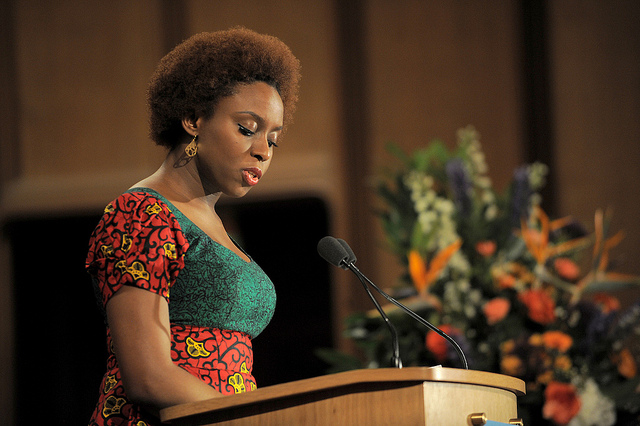Laverne Cox Responded to Chimamanda Ngozi Adichie’s Argument That Trans Women Aren’t Women


A common argument lobbed against trans women by TERFs and many well-meaning but misunderstanding feminists is that trans women are not women because they have some experienced some modicum of male privilege. In an interview with Channel 4, writer and novelist Chimamanda Ngozi Adichie posed a similar argument, saying that “trans women are trans women,” as opposed to being just, well, women.
Specifically, Adichie said:
I think the whole problem of gender in the world is about our experiences. It’s not about how we wear our hair or whether we have a vagina or a penis. It’s about the way the world treats us, and I think if you’ve lived in the world as a man with the privileges that the world accords to men and then sort of change gender, it’s difficult for me to accept that then we can equate your experience with the experience of a woman who has lived from the beginning as a woman and who has not been accorded those privileges that men are.
The biggest issue with Adichie’s argument here centers on the mistaken belief that trans women have experienced any kind of male privilege at all. It is reductive and harmful to think that trans women have had the same experience as any other male growing up; it carries with it the implication that trans women are still—in some way, shape or form—men, due only to their experiences.
While it’s important to acknowledge that not all trans women share the same experiences growing up, and everybody’s story is different, for the most part, trans women face an experience that is markedly different from their male counterparts. Actress, activist, and trans icon Laverne Cox shared her own experience in a tweet thread, one that certainly echoes and resonates with many (myself included).
1.I was talking to my twin brother today about whether he believes I had male privilege growing up. I was a very feminine child though I was
— Laverne Cox (@Lavernecox) March 11, 2017
2. Assigned male at birth. My gender was constantly policed. I was told I acted like a girl and was bullied and shamed for that. My
— Laverne Cox (@Lavernecox) March 11, 2017
It’s not too long, but it’s very much worth your time and attention. As Cox argues, beliefs like Adichie’s lack intersectionality; to believe that there is one experience of gender or womanhood is to eliminate the diverse, shared experiences of many women.
The “trans women have experienced male privilege and are thus not women” argument is tired, but persistent—and seemingly immortal. It serves to isolate and other trans women. Arguments like these are formulated with the exact purpose of invalidating the lived experiences of trans women everywhere. This is why it’s so, so important to highlight and boost trans voices and stories. This is why it’s so critical for all of us to listen when a trans woman opens up to share her experiences, because every time those stories go unheard, the experiences of anybody else who would come forward are automatically discounted.
All of this isn’t to discredit or criticize Adichie’s other prominent works. She’s certainly done a lot in service of feminism and women in our time. But like anybody else in this world, it’s important for us to acknowledge our blind spots and cop to what we may not know. That is, after all, the point, isn’t it? We’re supposed to be learning from each other, right?
(via Teen Vogue, image via Commonwealth Foundation on Flickr)
—The Mary Sue has a strict comment policy that forbids, but is not limited to, personal insults toward anyone, hate speech, and trolling.—
Follow The Mary Sue on Twitter, Facebook, Tumblr, Pinterest, & Google+.
Have a tip we should know? tips@themarysue.com